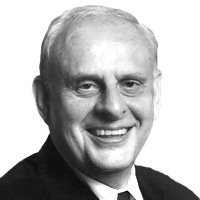
A sigh of relief went through the White House and the Obama administration today when the president named Thomas E. Donilon as the new national security adviser. It’s not that the denizens of the national security bureaucracy love Mr. Donilon; he’s been tough on them. But he is a known figure, safe and sound, and widely seen as a first-rate professional. He is the guy who as the deputy national security adviser for the past two years has made the policy trains run on time and coherently. His great strengths are as a manager of a difficult national security bureaucracy and as a keen mind on the politics of foreign policy. Most don’t see him as a foreign policy strategist, but he fully understands strategy and is now committed to framing and putting strategies in place.
Mr. Donilon was the odds-on favorite to succeed General James Jones, the outgoing national security adviser. General Jones is actually happy to be leaving. The job really wasn’t the best fit for him. He’s not a politician or a strategist, and he did not fit in with the Obama crowd. He became passive and isolated. It was quite sad. The general had been an outstanding Commandant of the Marine Corps and NATO’s chief commander. He was widely respected and admired in all his previous roles.
The president and his team expected that General Jones’ remarkable standing in the military and in conservative circles would protect President Obama’s right flank. They expected him to explain the president’s policies to the military, and to keep the generals in line. Things just didn’t work that way. It seemed as if the general just lost heart to be a major player.
Tom Donilon, on the other hand, was charged with running the inter-agency meetings process—and virtually everyone felt that he alone was responsible for getting things done and for whatever coherence there was to the administration’s foreign policy. In this capacity, Mr. Donilon was already actually chairing meetings where the secretaries of State and Defense and other cabinet-level officials participated. In other words, the top people in the administration are already used to Donilon’s running the meetings.
Mr. Donilon had extensive experience in the State Department as top consigliere to Secretary of State Warren Christopher. He subsequently became a very familiar figure and participant in foreign-policy think tanks. He rarely wrote foreign-policy articles and generally confined himself to the give and take of the policy wonk meetings. He was the key figure in preparing Senator Obama for the foreign-policy side of his debates with Senator John McCain. In other words, he is a very well-known factor in Washington both from his foreign policy and political activities on the one hand, and as an attorney at O’Melveny and Myers on the other.
Jones is not a politician or a strategist, and he did not fit in with the Obama crowd. He became passive and isolated. It was quite sad.
Mr. Donilon is mulling his models for the NSC tasks—whether to be more of a dominating figure like Henry Kissinger or more of the policy adjudicator/shaper a la General Brent Scowcroft. Those who know him well believe that he will lean strongly toward the Scowcroft model. General Scowcroft served both President Ford and President George H.W. Bush as national security adviser. He made sure that all the top officials had their say and their day in court with the boss. All trusted him to be reliable and fair in presenting the president with all points of view. But then the general worked closely with the president and other top officials like James Baker to guide policy in a practical and coherent direction.
• Richard Wolffe: Jones Was Pushed• Why James Jones QuitMr. Donilon could have some difficulties with the top two players in the administration—Secretary of State Hillary Clinton and Defense Secretary Bob Gates. Mrs. Clinton is known to have various complaints about the Donilon style, and State Department officials generally feel he has been especially hard on them. Mr. Gates reportedly has much stronger feelings. According to Bob Woodward’s new book, Obama's Wars, Gates told General Jones that Donilon would be a “disaster” as national security adviser.
At least initially, these feelings will complicate Mr. Donilon’s new life in that large corner office of the White House’s west wing. He will have to sit down with the two secretaries—and with Joint Chiefs Chairman Mike Mullen as well—and work out the problems right away.
Leslie H. Gelb, a former New York Times columnist and senior government official, is author of Power Rules: How Common Sense Can Rescue American Foreign Policy (HarperCollins 2009), a book that shows how to think about and use power in the 21st century. He is president emeritus of the Council on Foreign Relations.





